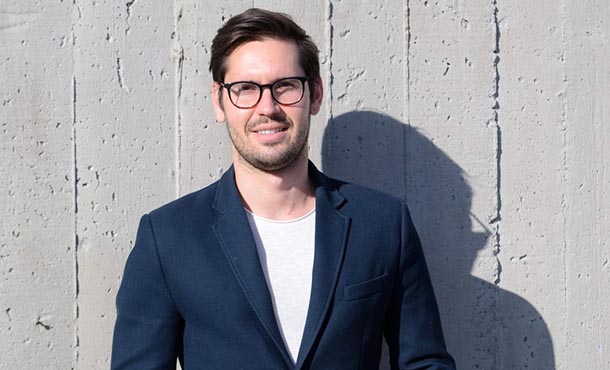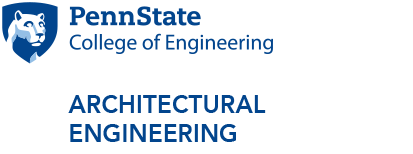
Juan Pablo “JP” Gevaudan, a building materials researcher, joined Penn State’s Department of Architectural Engineering as affiliate professor in the department's structural engineering research group. IMAGE: JP GEVAUDAN
Building materials researcher joins architectural engineering
9/13/2019
By Mariah Chuprinski
UNIVERSITY PARK, Pa. — Juan Pablo “JP” Gevaudan, an experimental cement chemist and current Marie Skłodowska-Curie Research Fellow, joined Penn State’s Department of Architectural Engineering on Aug. 16 as an affiliate professor.
A member of the department’s structural engineering group, he will become a tenure-track assistant professor on July 1, 2021.
Gevaudan’s research focuses on developing innovative, sustainable and resilient building — or cementitious — materials that, unlike conventional concrete, have lower degradation rates over time and have a decreased carbon footprint. Ultimately, these new materials have the potential to achieve a symbiotic relationship between the built and natural environments, leading to stronger and longer-lasting buildings.
“JP’s research on developing new cementitious building materials that are responsive to and capable of adapting to local environments is a timely response to the urgent need to improve material durability globally,” said Sez Atamturktur, Harry and Arlene Schell Professor and head of the Department of Architectural Engineering. “JP has established himself as a leader in diversifying the portfolio of cementitious construction materials.”
According to Gevaudan, the most widely used building material in the world is concrete, which is made by utilizing a binder, ordinary portland cement (OPC), to “glue” sand and gravel together and provide a hardened material. However, aside from poor durability in certain conditions, the production of OPC accounts for more than 4% of global carbon dioxide emissions.
“The materials we use in construction are a crucial aspect we will have to confront if we pursue the objective of having a low-carbon dioxide world,” he said. “When we think about improving the sustainability of buildings and infrastructure, it has to start at the materials level.”
In response to these challenges, Gevaudan will create the Responsive and Adaptive Infrastructure Materials (Re-AIM) Laboratory to research the durability of conventional and innovative cementitious materials with the mission of diversifying the current suite of construction materials.
“The scientific findings of the research group will ‘re-aim’ the current construction industry, which prioritizes the use of conventional concrete, and encourage the use of these new materials that are capable of adapting to degradation forces,” he said.
In a multi-disciplinary approach, the research group will merge the fields of cement chemistry, building science and materials science through both experimental and computational methods, to look at the performance and degradation of the new materials.
Gevaudan is currently completing a two-year Marie Skłodowska-Curie Research Individual Fellowship, ending in May of 2021, at the University of Leeds in the United Kingdom. In his project, entitled Passive layER FailuRe Mechanisms for Steel Embedded in Alkali-Activated Slag Materials, he examines how environmental conditions affect the steel corrosion mechanisms in low-carbon dioxide, durable cements known as alkali-activated cements.
“I’m looking forward to bringing back the lessons I’m learning in this fellowship to Penn State architectural engineering students and to expand the department’s research portfolio,” Gevaudan said.
Starting in 2021, Gevaudan will create and teach an undergraduate course on materials science. He also will teach and expand on an existing graduate course on building performance failures and forensic techniques in partnership with M. Kevin Parfitt, professor of architectural engineering.
Gevaudan is committed to advancing involvement of underrepresented students in science, technology, math and engineering, including students with a variety of racial, gender and ethnic backgrounds, as well as unique family/economic backgrounds like first-generation higher education students, students transferring from community colleges and low-income students.
He will actively recruit diverse and multi-disciplinary undergraduate students, graduate students and postdoctoral candidates to staff his lab.
He was a leader on the graduate advisory board of the College of Engineering and Applied Sciences Dean's Office at the University of Colorado at Boulder, where he received his doctorate in architectural engineering in August 2019. In his role on the board, he led diversity initiatives like CUnity Day, a college-wide initiative that encouraged inclusivity and celebrated international students. He also represented the university at recruitment events for diverse candidates, such as the SACNAS national conference.
Additionally, Gevaudan was involved with the Colorado Diversity Initiative Office, where he organized the educational activities of 28 graduate student mentors in a diversity-focused research experience for undergraduates, called the Summer Multicultural Access to Research Training.
“I am very excited about JP joining our department and am particularly impressed with his commitment to improve diversity in STEM,” Atamturktur said. “There is no doubt JP will be a strong force forward as we broaden the department’s participation in initiatives to increase diversity.”



